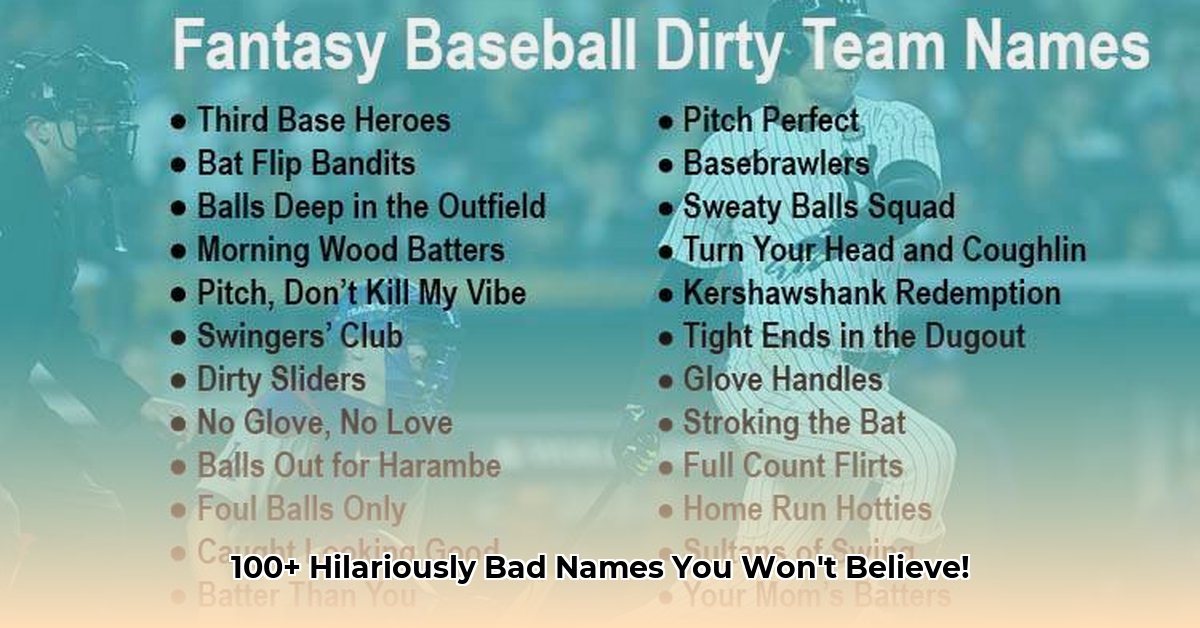“`markdown
Unbelievable Funny & Inappropriate Names: 100+ Examples
Okay, let’s talk about names. You know, the kind that make you do a double-take, maybe giggle a little nervously, or maybe even blush. We’re talking about those funny, sometimes wildly inappropriate names that pop up every now and then. Why do people choose them? What makes them so funny (and sometimes so offensive)? This article dives into that weird and wonderful world of unintentionally hilarious and totally inappropriate names. We’ll look at all sorts of examples – from silly sound-alikes to names with hidden meanings – and talk about why they work (or don’t). We’ll even touch on the tricky bit of figuring out when a funny name crosses the line. So buckle up, get ready for some laughs, and maybe learn a thing or two about the strange power of a name. For more examples, check out this great list of funny fake names.
Funny and Inappropriate Names: A Hilarious Deep Dive
Let’s dive headfirst into the wonderfully weird world of funny and inappropriate names! We’re talking about those names that make you chuckle, maybe blush a little, and definitely raise an eyebrow. This isn’t about being mean-spirited; it’s about exploring the unexpected humor hidden within the seemingly mundane act of naming. Think of it as a linguistic rollercoaster—buckle up! Prepare for a deep dive into humor in names, offensive name examples, and comedic names.
This journey into the amusing and occasionally awkward realm of naming will explore how seemingly ordinary words can become unexpectedly hilarious, how cultural context drastically alters the impact of a name, and, crucially, how to avoid unintentionally causing offense. We’ll cover everything from subtle wordplay to names that’ll make you spit out your coffee (and maybe apologize afterward).
1. Phonetic Puns: The Sounds of Laughter
We’ll begin with the classics—names whose humor rests entirely on how they sound. Names like “Ben Dover” are prime examples of phonetic wit; the humor hits you like a well-timed punchline. It’s a simple, yet brilliant example of how sound-alike words can create unexpected hilarity. The context, however, is crucial. “Ben Dover” is hilarious among friends, but not ideal at a formal dinner. See the difference? These are sound-alike names, pun names, and comedic plays on words.
This type of name plays on the unexpected juxtaposition of sounds, transforming ordinary words into comedic gold. Consider “Mike Hunt,” “Hugh Jass,” or “I. P. Freely”—each a testament to the creative (and sometimes questionable) side of human naming conventions. These names highlight the surprising power of simple pronunciation shifts to turn a typical name into something uproariously funny. Just imagine the delighted gasps and knowing grins! Other examples include:
- Phil McCracken
- Dixie Normous
- Seymour Butts
2. Double Entendre Delights: Playing on Words
Now, we’re stepping up the game to double entendres—names with two (or more!) meanings. This type of humor relies on subtle (or not-so-subtle) innuendo. “Wanda Lay,” for instance, sounds innocuous enough until you really think about it. The humor is in that unexpected second interpretation. These names require a bit more brainpower to decode, adding to their comedic appeal. It’s like a linguistic puzzle with a punchline! This section includes double meaning names, innuendo names, and the psychology of funny names.
The humor here is definitely subjective. One person’s side-splitting joke might be another person’s cringe-worthy moment. Context, once again, is absolutely vital. What might be uproariously funny in a close-knit group could create quite the awkward silence at a family gathering. The subjectivity of humor is fascinating—what makes one person laugh might make another squirm. Further examples of double entendre names that elicit a variety of reactions include:
- Eileen Dover
- Holden McGroin
- Ivana Humpalot
3. Beyond the Basics: The Wild West of Naming
But the world of hilariously inappropriate names doesn’t end there. Some names are just plain outrageous—pure comedic spectacle. These names go beyond simple puns or double entendres; they’re over-the-top, silly, and fantastically unexpected. Picture a dog named “Sir Barks-a-lot” or a cat christened “Meowdonna”. The pure absurdity and unexpectedness elevate these names to another level of comedic genius. It’s all about embracing the unexpected! We’ll also explore outrageous names, silly names, and unexpected names.
However, let’s be clear: not all funny names are created equal. Some cross the line into truly offensive territory. It’s crucial to be sensitive to potential hurt feelings and avoid causing offense. Humor should never come at someone else’s expense. Outrageously silly names, when carefully chosen, can be a source of harmless fun:
- Puce C.
- Slou Paece
- Durtie Sanchez
4. A Quick Guide to Navigating the Name-Game
Here’s a handy guide to help you assess the appropriateness of a name, given its context:
| Name Type | Appropriateness | Example | Considerations |
|---|---|---|---|
| Phonetic Puns | Highly Context-Dependent | Ben Dover, Mike Hunt | Audience, setting, your relationship with the person |
| Double Entendres | Highly Context-Dependent | Wanda Lay, Phil McCrackin | Same as above |
| Outrageous/Silly | Generally acceptable, use caution | Sir Barks-a-lot, Meowdonna | Avoid potentially offensive themes or stereotypes |
| Explicitly Offensive | Never appropriate | Names using slurs or hate speech | Absolutely unacceptable, avoid at all costs |
5. The Cultural Context and the Ever-Evolving Landscape of Humor
The appeal of these names often lies in their ability to challenge social norms and expectations. They play with language, subvert traditions, and create humor from unexpected places. But with that humor comes responsibility. Understanding cultural nuances is key. A name considered hilarious in one culture might be deeply offensive in another. Ongoing research in linguistics and cultural studies continues to explore how humor and naming practices evolve. There is much to learn, and our understanding is constantly being refined. This includes cultural sensitivity in naming, linguistic evolution, and ethical considerations in humor.
Ultimately, the best approach is thoughtful consideration. Before you christen your pet, name your business, or even suggest a name for a new acquaintance, take a moment to weigh the potential impact, considering your audience and the overall context. Remember, laughter is great, but responsible laughter is always better. Examples of names that require careful consideration due to cultural context are:
- Those referencing deities or religious figures in a disrespectful manner.
- Names that inadvertently translate to offensive words in another language.
- Plays on names from cultures that have experienced historical oppression.
Unbelievable Funny & Inappropriate Names: How to Avoid Legal Trouble Using Funny Inappropriate Names
Here’s the deal: crafting a funny online persona can be a blast, but picking the wrong name can land you in hot water. Let’s explore some hilarious – and potentially hazardous – naming choices. We’ll also cover how to avoid legal trouble using funny inappropriate names. This section covers legal names, online safety, and harassment prevention.
Phonetic Puns: A Risky Business
Phonetic puns exploit the similar sounds of words to create humorous, often inappropriate, names. Think “Hugh Jass” – undeniably funny, but potentially offensive depending on the context. The key here is audience and context. What’s hilarious with friends might be deeply inappropriate at a job interview.
- Example: “Lettuce Turnip the Beet.” Cute? Maybe. Professional? Absolutely not.
This type of name relies on shared cultural understanding. However, a lack of consideration for your audience could lead to misunderstandings. For example, some phonetic puns may be misconstrued as direct insults, leading to accusations of harassment or defamation.
Double Entendres: Walking a Tightrope
Double entendres are words or phrases with two meanings, one innocent, the other suggestive. These can be incredibly funny, but misinterpretations can create awkward situations.
- Example: “Ben Dover.” Funny among friends, disastrous in a formal setting.
The line between humorous and offensive is incredibly thin. What one person finds hilarious, another might find deeply insulting. Understanding your audience is crucial. In some cases, a double entendre might be interpreted as an attempt to solicit or exploit, especially if it carries a sexual connotation.
Cultural References: Proceed with Caution
Referencing cultural figures, historical events, or slang terms can be amusing, but it’s a minefield. Offensive stereotypes and historical insensitivities can cause significant harm.
- Example: Names referencing controversial historical figures or ethnic slurs are absolutely unacceptable.
Consider the potential impact on others before choosing a name. What might seem funny to you could be deeply hurtful to others. Using cultural references that are considered hate speech or promote discrimination can result in legal consequences.
The Art of the Subtle Inappropriate Name
Some names are subtly suggestive, requiring a little more understanding to grasp the joke. These are generally safer, but the risk
- How to Stop Apps From Running in the Background to Boost Your - December 1, 2025
- How To Move Apps On Your Droid For Better Organization - November 30, 2025
- How to Move Apps on Android for Better Organization - November 29, 2025










